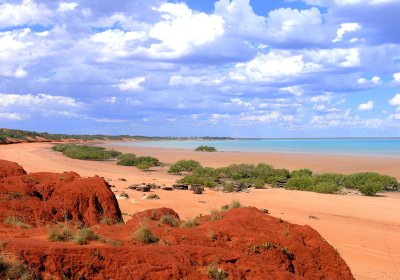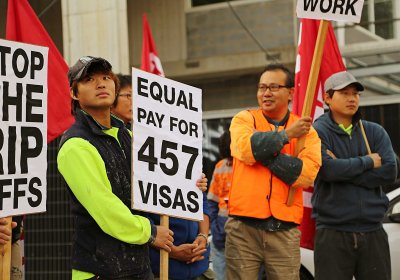A protest against using the Victorian port of Hastings for brown coal exports attracted 200 people on November 9, including locals and community members from across Gippsland.
Several coal export projects are seeking to use land at Hastings in Western Port, south-east of Melbourne, for a one-square-kilometre brown coal drying facility and port.
989
"Never before in the history of Latin America have there been such a number of left-wing governments in power at the same time," Steve Ellner, a visiting fellow at the Australian National University and professor in economic history at the Eastern University in Puerto La Cruz, Venezuela, told a public forum in Sydney on November 9.
The forum was organised by the Latin America Social Forum (LASF) and also featured Sarah Motta, senior lecturer in politics at the University of Newcastle. Both speakers had edited editions of the journal Latin American Perspectives earlier this year.
The newly formed Illawarra Aboriginal Solidarity Group will hold a launch on November 21 with the screening of two films at Wollongong TAFE.
The Illawarra region has a strong history of activism around the injustices that Indigenous people face, including past campaign work by the South Coast Aboriginal Advancement League and the Illawarra Aboriginal Rights Group.
Lyle Davis, a Brierley/Piety/Dharawal man, emphasises that while this is the launch of a new group it is continuing on with work that has taken place for many years.
The Western Australian government has finalised its acquisition of land in the Kimberley for future development, despite long-standing opposition from environmentalists and the local Aboriginal community.
The 3414 hectares of land near James Price Point — part of one of the most ecologically opulent and pristine stretches of land left in the world — north of Broome, was bought from traditional landowners as “unallocated crown land.”
The area is now under management of LandCorp and the Broome Port Authority.
Over the years, I have heard many left-wing activists say that mass peaceful protests do not achieve anything. Rather, “militant actions” which “take it up to the ruling class” are more important.
But for smaller direct actions to have any real political significance, they have to be connected to a patient and democratic approach to building mass movements that can win reforms. Smaller direct actions that are not tied to this political aim are a posture.
Another round of United Nations climate talks were being negotiated in Warsaw, Poland, this week when the strongest typhoon recorded to hit land swept across the Philippines before moving on to Vietnam. Typhoon Haiyan, known locally as Yolanda, has killed an estimated 10,000 people in the area of Tacloban, mostly from the strong tsunami-like storm surges that accompanied the typhoon. Entire villages were flattened and a large rescue effort is underway to evacuate survivors.
Vocational education has become one of the fastest growing markets in Australia. There are more than 5000 private providers; half receive government funding and many accrue enormous profits.
This huge rise in private providers has made it impossible for the regulatory system to adequately police them, so there is little guarantee of the quality of courses.
But federal and state governments have embraced private providers' “user-pays” ideology rather than commit to free, high-quality public education for all as a human right.
Debate on a dangerous bill that seeks to redefine when life begins was again suspended in the New South Wales Parliament on November 14.
The Crimes Amendment (Zoe's law) (No 2) bill, introduced in August, will be debated again in the legislative assembly on November 21. Doubts remain as to whether it will be voted on then, or deferred to next year.
For as long as rulers have abused their power there has also been political satire. Satirists have used wit and comedy as a weapon against the powerful, sometimes braving imprisonment, torture or the gallows.
All workers are treated equal, right? Same award rates for the same work, equal pay for women and uniform national modern laws. But what about workers who are not allowed to work, such as refugees on bridging visas; or workers brought by employers to Australia on 457 visas, who are used for a short time and then sent back?
Are these workers being treated equally and how can their treatment affect the rest of us in the future?
I am a 32-year-old mother of two from suburban Perth. I am writing in regard to the case of Latifa, a 31-year-old woman of the persecuted Rohingya people of Myanmar [Burma], who recently gave birth in immigration detention. Her newborn child is in NICU [neonatal intensive care unit] and her access is strictly limited due to the harsh and inhuman policies of your department. The child has never had any contact with its father also held by your department.
- Previous page
- Page 3
- Next page







